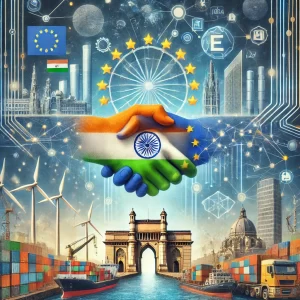India and the European Union (EU) share a longstanding economic partnership, rooted in mutual interests spanning trade, investment, technology, and sustainable development. As of 2024, this relationship is evolving rapidly, driven by geopolitical shifts, economic reforms, and a renewed focus on strategic collaboration. Let’s dive into the latest developments in India-EU trade relations, the factors shaping this dynamic, and what lies ahead.
Historical Context of India-EU Trade Relations
The EU is one of India’s largest trading partners, accounting for a significant share of its exports and imports. Over the decades, both regions have engaged in various bilateral agreements, fostering economic ties. The relationship gained momentum with the 1994 Cooperation Agreement, followed by the 2004 Strategic Partnership. However, the much-anticipated Free Trade Agreement (FTA), under negotiation since 2007, faced multiple roadblocks — from market access issues to disagreements over labor and environmental standards.
New Developments in 2024: A Turning Point
After years of stalled negotiations, 2024 marks a breakthrough in India-EU trade relations. Several key developments are reshaping the economic landscape:
- Resumption of Free Trade Agreement (FTA) Talks
- In early 2024, both sides resumed negotiations on the FTA with renewed vigor. Key sticking points, including intellectual property rights, data security, and sustainable trade, saw significant compromises.
- India’s push for greater access to the EU’s markets — particularly for textiles, agricultural products, and pharmaceuticals — is met with EU demands for stronger commitments on climate action, digital trade, and investment protection.
- Bilateral Investment Protection Agreement (BIPA)
- Parallel to the FTA, India and the EU finalized a long-awaited Bilateral Investment Protection Agreement. This pact aims to provide a stable and predictable investment climate, ensuring legal safeguards for investors on both sides.
- Green and Digital Partnerships
- Sustainability and digital transformation are emerging as central pillars. In 2024, India and the EU launched the Green Strategic Partnership, aligning efforts on renewable energy, carbon reduction, and climate-resilient infrastructure.
- Additionally, the Digital Partnership Agreement fosters collaboration in AI, cybersecurity, and data governance — positioning both regions as key players in the global tech economy.
- Boost in Trade Volume
- Trade between India and the EU surged in 2024, driven by demand for technology services, machinery, chemicals, and apparel. India’s exports to the EU now include a growing share of electric vehicles (EVs) and green tech components, reflecting shifting market dynamics.
- Geopolitical Factors
- Global tensions — including supply chain disruptions and the diversification away from China — have positioned India as an attractive alternative for European businesses seeking stable manufacturing hubs.
Key Sectors Benefiting from the New Developments
- Pharmaceuticals and Healthcare: India’s robust pharmaceutical industry, already a significant supplier to the EU, benefits from streamlined regulatory processes and expanded market access.
- Renewable Energy: With both regions committed to carbon neutrality, joint ventures in solar, wind, and hydrogen technology are on the rise.
- IT and Digital Services: India’s tech expertise complements the EU’s digital ambitions, fostering collaborations in AI, cloud services, and smart infrastructure.
- Automobiles and Electric Mobility: Indian EV manufacturers are gaining traction in Europe, supported by lower tariffs and sustainable tech investments.
- Agriculture and Processed Foods: Improved market access helps Indian farmers and food processors expand exports of organic produce, spices, and specialty foods.
Challenges Ahead
Despite the progress, several hurdles remain:
- Regulatory Barriers: Differences in product standards, certification processes, and data privacy laws could slow trade momentum.
- Climate and Labor Standards: The EU’s emphasis on green policies and labor rights might clash with India’s priorities, requiring nuanced negotiations.
- Geopolitical Risks: Any escalation in global conflicts or supply chain disruptions could impact trade flows.
Economic and Strategic Implications
The evolving India-EU trade relationship holds strategic significance. For India, deeper ties with the EU — a key global economic bloc — enhance its bargaining power in international trade. The EU, in turn, secures a reliable partner in Asia, diversifying supply chains and accessing India’s vast consumer market.
Moreover, the strengthened partnership underscores shared democratic values, positioning India and the EU as global leaders in sustainable development and technology governance.
Conclusion: A New Era for India-EU Trade Relations
2024 stands as a pivotal year for India-EU trade relations. The revival of FTA talks, the landmark Bilateral Investment Protection Agreement, and collaborations in green and digital sectors signal a new chapter of economic growth and strategic alignment. While challenges persist, the potential for a robust, mutually beneficial partnership remains stronger than ever.
As India continues to emerge as a global economic powerhouse, its deepening ties with the EU could redefine the global trade landscape — fostering innovation, sustainability, and prosperity for both regions.
Would you like to dive deeper into any particular sections, or explore a different angle on this evolving relationship?


